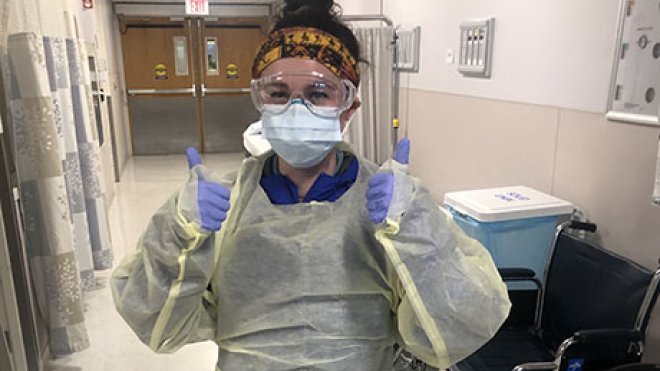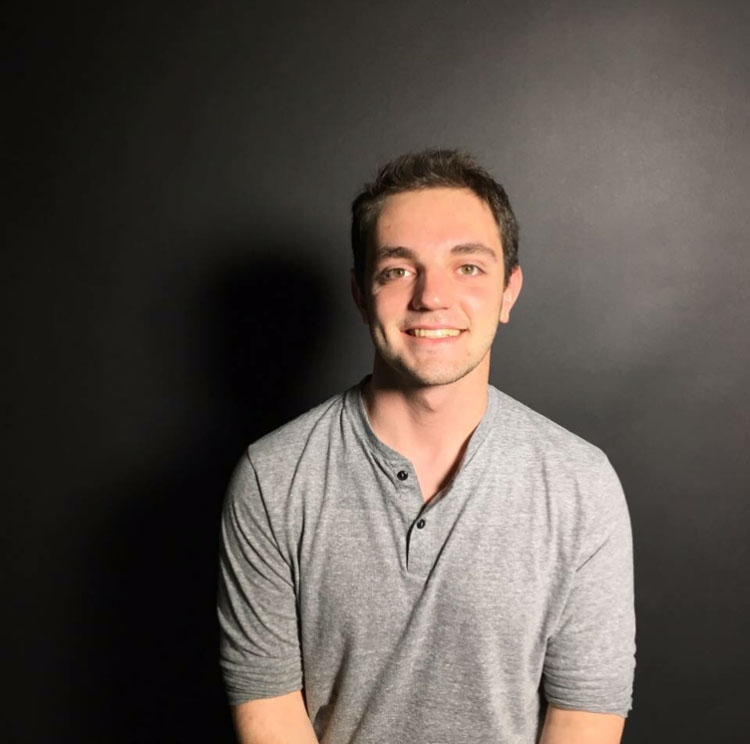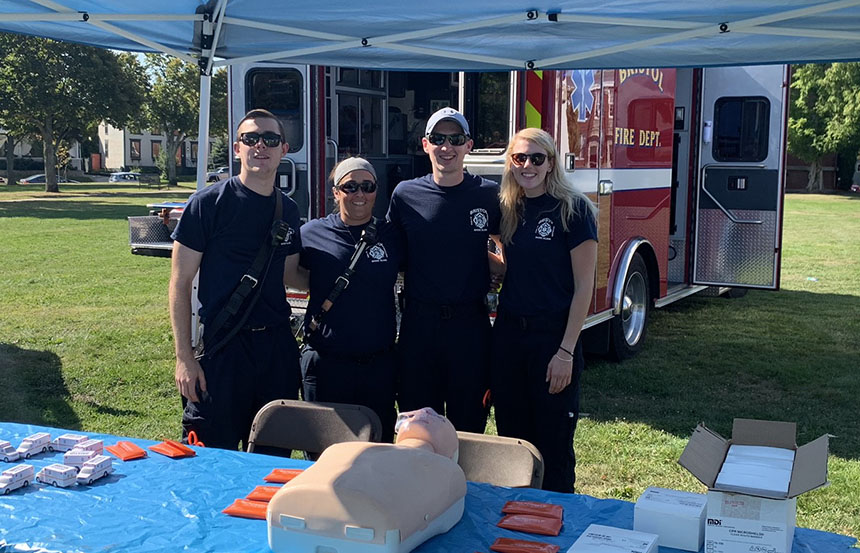On 'Hyper Alert': RWU Students are EMTs on Front Lines of Pandemic
Four RWU students serving as EMTs in their communities share stories of what they're learning, in class and while caring for patients, during this critical, historic time.

"Being an EMT is not a glory job. It’s a tough job. This is our job," said RWU Junior Lea Peterson, a licensed emergency medical technician (EMT) for the Beauport Ambulance Service in Gloucester, Mass.
She is one of several RWU students serving the public on the front lines on the COVID-19 pandemic as EMTs. On top of homework and classes, these students take on the responsibility of being first responders in emergencies.
While these students have been EMTs for several years, the COVID-19 pandemic brings new challenges. "It is emotionally draining throughout the day to have these COVID-19 calls," said RWU Senior Brett Lowder, who volunteers as an EMT for the Bristol Fire Department. These hard working students are gaining experience and integrating their college studies with lessons learned on the job.
"It’s really the perfect time to be a Public Health major. I absolutely love the major, but especially now," said Jake Amendola, RWU Junior and EMT for the Wyckoff Volunteer Ambulance Corps. "My professors have added in a lot of COVID-19 specific lessons in health policy and immunology. They’ve talked about how the virus works, different drug trials and treatments, and how different governments and organizations are handling the pandemic. It’s really fascinating."
These four RWU students serving as EMTs made time to talk to us about what they're learning, in class and while caring for patients.
Lea Peterson
EMT for Beauport Ambulance Service & RWU Junior
Double Major: Biology and Public Health
What have you learned working on the frontlines of the COVID-19 Pandemic?
As an EMT, you’re working with one other person, and only that person, for eight to 24 hours. You have to have complete trust in that person because you sometimes find yourself in tricky situations and you don’t always know what to do. There is patient care, liability, and your license on the line. This experience has taught me to have more trust than I’ve had in the past.
What can the public do to support EMTs and other frontline workers?
Have empathy and stay home.
You aren’t just staying at home to keep yourself safe, you are staying at home to keep others safe. I complain about quarantine all the time, don’t get me wrong, but at the end of the day I have to step back and remember what is important for the good of the population. My co-workers and I are afraid that people will go back to business as usual. If that happens, things will get a lot worse. Listening to the people that have the evidence is important. It’s difficult to do in today’s climate, but refer directly to places where you know you’re getting non-biased information.
How do your classes at RWU connect to your work as an EMT?
I’m getting an all-inclusive look at how healthcare works in my classes. I’m taking epidemiology right now. We’re talking about the math behind the research and methods, why flattening the curve works. I’m also in a health policy class. We just wrote a health policy memo directed to Rhode Island Gov. Gina Raimondo. She actually just said she was going to close public schools for the rest of the semester, but we were writing a health policy memo encouraging that.
Jake Amendola
EMT for Wyckoff Volunteer Ambulance Corps & RWU Junior
Major: Public Health
Minors: Biology and Psychology
What made you want to become an EMT?

The idea first crossed my mind during Hurricane Sandy. I remember standing in a long line of people with my dad at a gas station to get a small jug of gasoline for a generator. Nobody had power for over a week. I remember wishing I could help in some way. When I was 15 or 16, my school had a volunteer fair where many local organizations had different table displays. I saw my town’s local ambulance corps at a table so I went and filled out an application that day. A month later I became a member, and I just hit my four-year mark as a volunteer. I volunteer as much as I can.
How do you apply what you learn at RWU to your work as an EMT?
My biology courses helped my work by providing me with more specific knowledge of anatomy and physiology. I’ve learned how diseases and different medical interventions work. It makes it easier to interpret research and data. As an EMS provider, I’m constantly getting updates from the Department of Health, the CDC, and even from my own volunteer ambulance corps. My classes make it easier to interpret data and figure out what precautions or treatments are necessary. I’ve taken a few philosophy courses which help me with the intense critical thinking, reading, and writing of documentation. My psychology classes help me talk with patients and calm them down on the way to the hospital. It’s very interesting.
How has the COVID-19 Pandemic changed your work?
I’m in New Jersey, so we have a much higher volume of COVID-19 cases than other areas. I’ve been taking on a lot more ambulance shifts than I normally would. A lot of the other volunteers are older adults and have been abstaining from volunteering because of the risk. The college and high school student volunteers have been taking on more shifts. This week I’ve taken on four 12-hour shifts.
Emily Bisanti
EMT for Bristol Fire Department & RWU Senior
Major: Public Health
Minor: Biology
What is it like to be a Public Health student during the pandemic?
Everything is changing rapidly because of the virus. Every day they put out new data. My professors have adjusted their courses. They are giving good supplemental assignments so that we are really getting all the latest information. One of my professors puts out shorter videos to keep us from being overwhelmed. They all talk about how this is a groundbreaking time, which is inspirational.
How do you help the Bristol Fire Department serve the community?
We have set up a communications center for an emergency hotline. I work there a few days each week. We set up meal requests for people over 65, bringing one to two meals every day and a few meals on Fridays so they are set for the weekend. People from the community are making masks for us and I’m helping hand those out. I also work a recurring shift as volunteer EMT.
Are you seeing any silver linings coming out of this emergency situation?
It’s great that everyone is so concerned about their own and others' health. People are active in the community and being nice to each other, bringing food to their neighbors and relatives if they are elderly or immunocompromised. Kindness goes a long way. A lot of people who were working hard are working harder.

Brett Lowder
EMT for Bristol Fire Department & RWU Senior
Major: Criminal Justice
Minor: Public and Professional Writing
How does being an EMT connect you with your community?
College students are a big backbone of the fire department. At any given moment when there is a medical emergency or fire in town, chances are it’s going to be college students coming to the call. There are probably 25 Roger Williams students right now who are very active in supporting the department. We are a bridge between Bristol and RWU. I have this other connection to the town of Bristol, and I know that everyone else on the fire department from Roger Williams has this connection to the town, too.
How has your experience changed with the COVID-19 Pandemic?
It has been one of the most interesting things I’ve lived through. It’s hard to wrap my mind around it. You walk into these coronavirus units in the hospital and just the conversations you overhear put life in general into perspective. You know at any moment that if you take your mask off or make a mistake you’re putting your patients or yourself at risk, so you have to be on hyper alert. More alert than you normally have to be.
Do you see this experience informing your future career?
I’m leaning toward pursing something in the fire service for my career because these experiences I’ve had have been so impactful. I feel like I’ve found a place where I can give back every day to the community. I know every day when I go to work I’m going to make a difference.
Interested in becoming an EMT?
Now's a good time to get started on a degree in Emergency Medical Services at RWU's University College